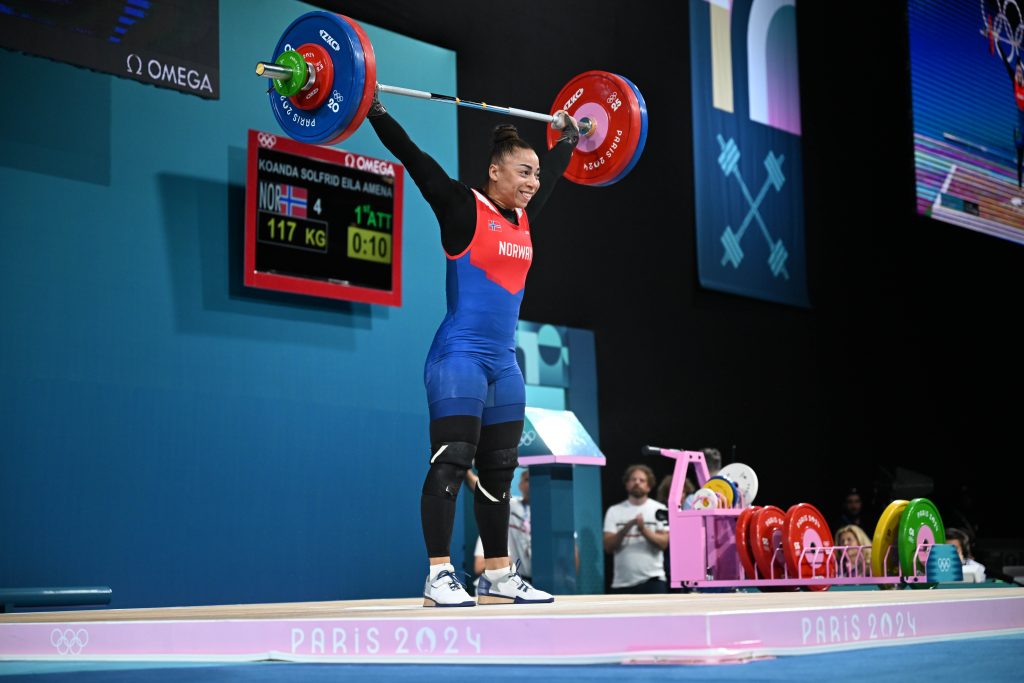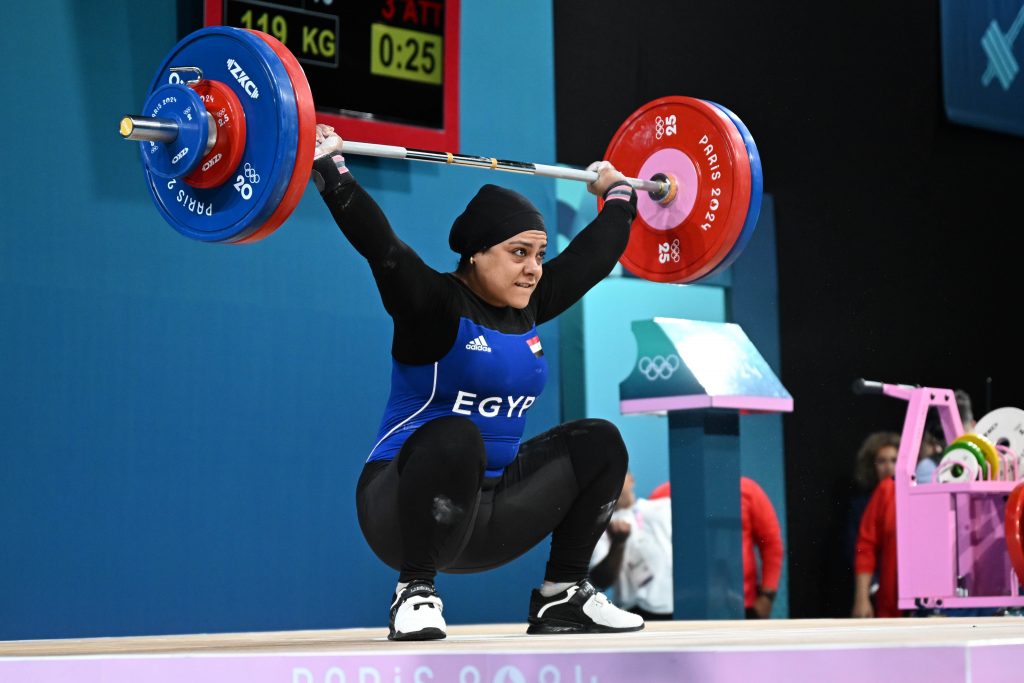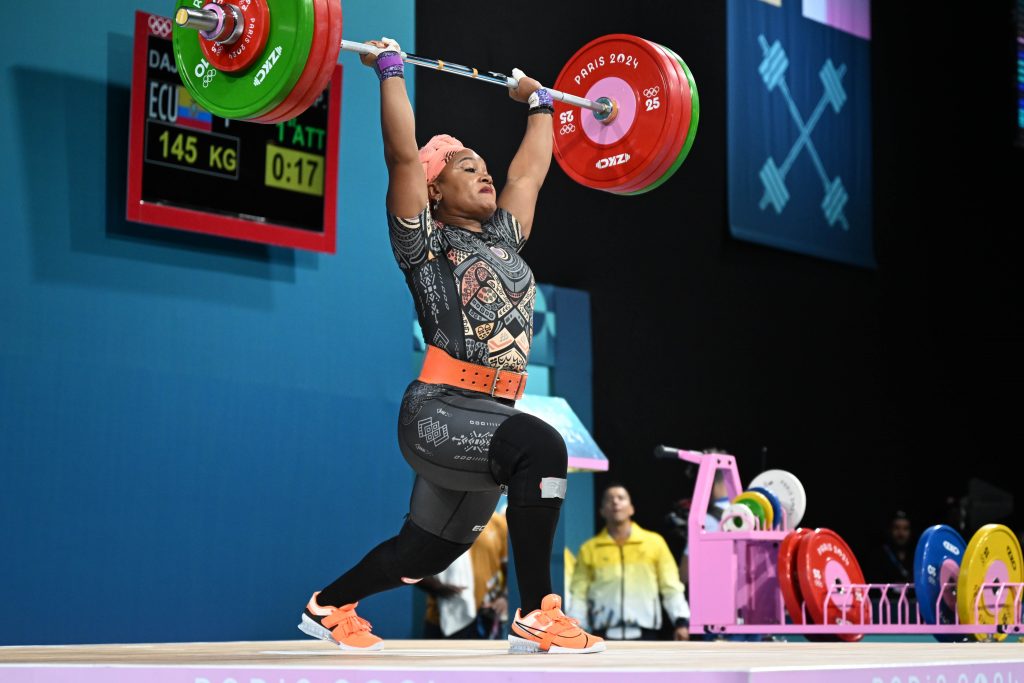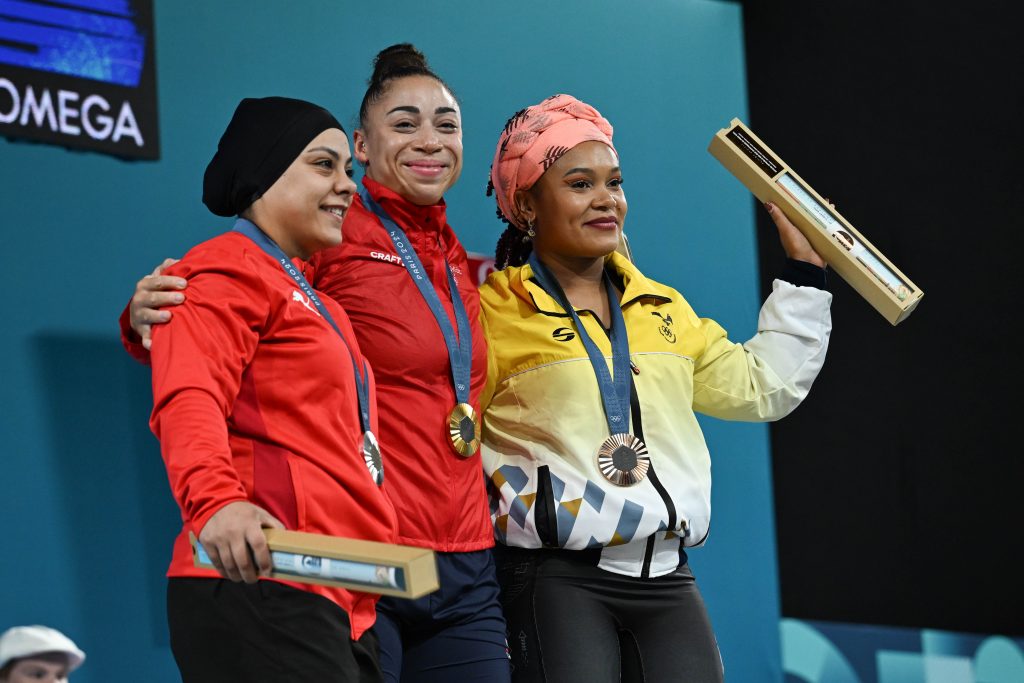Paris, Women 81: ‘Wow! Have I won?’ Solfrid Koanda is Norway’s first female Olympic champion – without knowing it
Solfrid Koanda was so focused on her own performance that she left the platform at South Paris Arena thinking she might just have blown her chance of Olympic gold. She had no idea that she had already won even before she went out and failed with a final world record attempt.
“I genuinely thought I might have let my big chance slip through my fingers,” said the 25-year-old Norwegian. “Every competition I go to, I don’t look at the scoreboard. I tell my coaches, ‘Don’t tell me,’ because I just want to focus on every lift the same. I don’t care what the others do.
“If it’s my first or last attempt, I need to have the same focus. If I let my emotions in there and start to think about what the lift means, I tend to forget what I have to do. And I managed to do that quite well.”
 Solfrid Koanda (NOR)
Solfrid Koanda (NOR)
So well that she thought her chance might have gone. “I was excited to go back to my coaches and ask, ‘OK, what did we get? What score?’ But they just told me, ‘Turn around. You got gold.’ And I was like, ‘What, are you joking?’ That was huge!”
That scoreboard showed Koanda had been 7kg clear with a lift to spare. Her failure to claim the clean and jerk world record on 162kg made no difference to the finishing order: Koanda first, Sara Samir from Egypt second and the Tokyo 76kg champion Neisi Dajomes from Ecuador third.
Koanda’s coach Stian Grimseth said, “When we knew Solfrid had won we didn’t show it. We thought we might as well finish off with a world record – why not?”
It was a remarkable achievement for Koanda, who had a difficult upbringing and spent much of her teenage life in foster care. She qualified as an electrician before becoming a full-time weightlifter, having taken up the sport far later than most of her fellow competitors.
“Since I was little I’ve always loved to work hard,” she said. “I feel like I’ve always had a purpose, and now I feel that working hard, lifting heavy weights is my purpose. And I got to shine on that stage today and receive a gold medal around my neck.
 Sara Samir (EGY)
Sara Samir (EGY)
“I feel like it doesn’t matter what kind of background you have. It doesn’t matter if you don’t have family or a mum who holds your hand to go to training.
“Whatever sport you want to do, you can still do it on your own. You just have to dig deep. I have also had many good friends around me, good support, even though it’s not family.”
Koanda will go into the record books as the first woman from Norway to win Olympic weightlifting gold, and the first European woman to win in a weight category above 80kg.
What the results will not show is that she is, surely, the first electrician to stand on top of the podium – and possibly the first to win after competing only once before in her weight category.
That was at the Grand Prix in Cuba in June last year, where Koanda totalled 266kg. She did much better today on 121-154-275, ahead of Samir on 117-151-268 and Dajomes on 122-145-267.
 Neisi Dajomes (ECU)
Neisi Dajomes (ECU)
Koanda competed at 87kg in all the other qualifiers, always weighing in at about 84-85kg. “That’s my training weight, and it made everything much easier,” she said.
Cutting a few kilos was not too difficult. Now Koanda can look forward to a nice meal. “I’ll be having a muffin and a few sweets,” she said.
Samir achieved the best result for an African woman in Olympic weightlifting, adding silver to the bronze she won at Rio 2016. Initially she had been tearful about finishing second, but later she said, “I should be proud of what I achieved. I had a back injury that stopped me improving fast enough. Really, I knew Solfrid would be sitting beside me with the gold medal. Maybe I can win in Los Angeles.”

Dajomes was equally proud, not just of her efforts after she, too, battled against injury, but of becoming the first woman from Ecuador to win two Olympic medals. “My body is asking for a bit of rest now,” she said.
Eileen Cikamatana from Australia failed with her last two attempts and finished fourth on 262kg. Yudelina Mejia from Dominican Republic came close to making her second clean and jerk on 150kg, which is 10kg more than her personal best, before dropping it. She was fifth on 256kg, and Kim Suhyeon from Korea was sixth on 250kg.
Yekta Jamali, formerly of Iran and now a member of the Refugee Olympic Team living in Germany, had career-best numbers across the board in ninth place on 103-128-231. At 19 she looks to have a bright future.
By Brian Oliver










